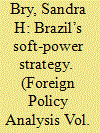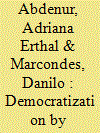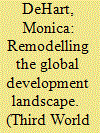| Srl | Item |
| 1 |
ID:
153544


|
|
|
|
|
| Summary/Abstract |
By trading upon the principles of South-South cooperation, Brazil is widely viewed as having gained a positive image worldwide. Brazil’s South-South development cooperation was one of the foreign policy instruments it used to raise this profile. However, studies of the generation of soft power are still lacking in the international relations literature, and where empirical research exists it focuses more on the results of soft power strategies than on how soft power is created. Therefore, this article explores how Brazil’s soft power strategy is conceptualized in Brazil’s development cooperation discourse and how it is operationalized through South-South development activities. This research uses a triangulation method combining the analysis of official documents, academic studies and interviews to conclude that the Brazilian government under President Lula (2003-2011) influenced the organization of its cooperation agency and guided it towards sectors and targets that contribute to the creation of positive outcomes. This article contributes to the debate on the state’s behavior in soft power, that is, the ‘behavior’ of the Brazilian government in the design of its cooperation agency’s activities, thus also contributing to knowledge about the relationship between an agent’s behavior and the outcomes of a country’s policy of ‘soft empowerment’.
|
|
|
|
|
|
|
|
|
|
|
|
|
|
|
|
| 2 |
ID:
153907


|
|
|
|
|
| Summary/Abstract |
The field of international development has undergone major shifts as South–South cooperation expands. New questions are being raised about the political implications of this cooperation, including with respect to democracy and human rights. In this paper, we analyse the role of Brazil, a democratic provider of South–South cooperation, in fomenting these principles in Africa. We find that explicit democracy promotion makes up a minority of Brazil’s cooperation with Africa. However, Brazil also engages in social policy initiatives which, despite not being labelled as democracy and human rights promotion, are inspired by Brazil’s own experiences with re-democratization—what we refer to as “democratization by association”. We argue that these initiatives—mostly geared towards institution-building in areas where Brazil seeks to promote itself as a hotbed of policy innovation—are disembedded from the political context in which they arose in Brazil. While this disembeddedness allows the Brazilian state to maintain its official discourse of non-interference, it also makes the political impact of Brazilian cooperation in Africa highly uncertain.
|
|
|
|
|
|
|
|
|
|
|
|
|
|
|
|
| 3 |
ID:
116878


|
|
|
|
|
| Publication |
2012.
|
| Summary/Abstract |
China's explosive growth and growing international influence have prompted policy makers and scholars to question how that country will reshape the global development landscape. While Western observers have used the concept of the China Model to describe China's development strategies and the potential threat they pose to Western liberal traditions, Chinese policy makers have promoted South-South cooperation to emphasise China's goal of a harmonious world order based on nation-state sovereignty and mutual benefits. This article explores these two competing organising principles with a focus on how each concept frames global development politics and China's relations with its development partners. Drawing on ethnographic research on China's new relationship with Costa Rica, I examine the assumptions and effects of these concepts in terms of how they shape specific development encounters. These examples suggest the intransigence of historical development inequalities and identities, which both support and limit China's global impact in significant ways.
|
|
|
|
|
|
|
|
|
|
|
|
|
|
|
|